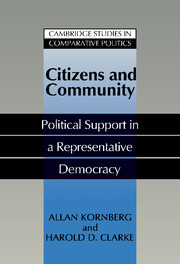4 - Political support and its correlates
Summary
National unity is an expression that evokes a variety of issues, ideas, feelings: the absence of conflict; loyalty to the national government; harmony or positive feelings among people in different parts of the country; pride and other good feelings about being Canadians; cooperation rather than tension between levels of government; giving precedence to one's Canadian identity over one's regional identity; the feeling of getting a good or bad deal from being part of the country, and so on.
Breton, Reitz, and Valentine, Cultural Boundaries and the Cohesion of Canada, p. 1The same can be said of the concept of political support. Feelings of loyalty toward and an identification with a national political regime and the political community of which it is a part, the belief that the regime is both effective and fair in its dealings with citizens, the latter's sensitivity toward, and even affection for, people and regions of the country other than their own - all of these should be correlates of political support as well as national unity. Indeed, because the two concepts are closely intertwined, in earlier chapters we have examined some of the images Canadians have of themselves, of their society and polity and their relationship to both. Those data provide the context in which we analyze the distribution, structure and correlates of the correlates of support for Canada's national political community, regime, and authorities.
POLITICAL SUPPORT: 1974-1988
In Chapter 1 we argued that in representative democracies such as Canada public support for key political objects is likely to be hierarchically ordered and to vary in stability over time. Support for the national political community should be the highest and most stable. Support for the national regime should be lower and somewhat more mutable, and that for political authorities should be even lower and more variable. This ordering of the levels and stability of support should obtain because democratic political cultures emphasize the distinction between political authorities, on the one hand, and the structure and processes of government (the regime) and the political community, on the other. Elected public officials both receive their “authority” from the public and are held accountable to them in periodic, constitutionally sanctioned elections.
- Type
- Chapter
- Information
- Citizens and Community , pp. 105 - 143Publisher: Cambridge University PressPrint publication year: 1992



